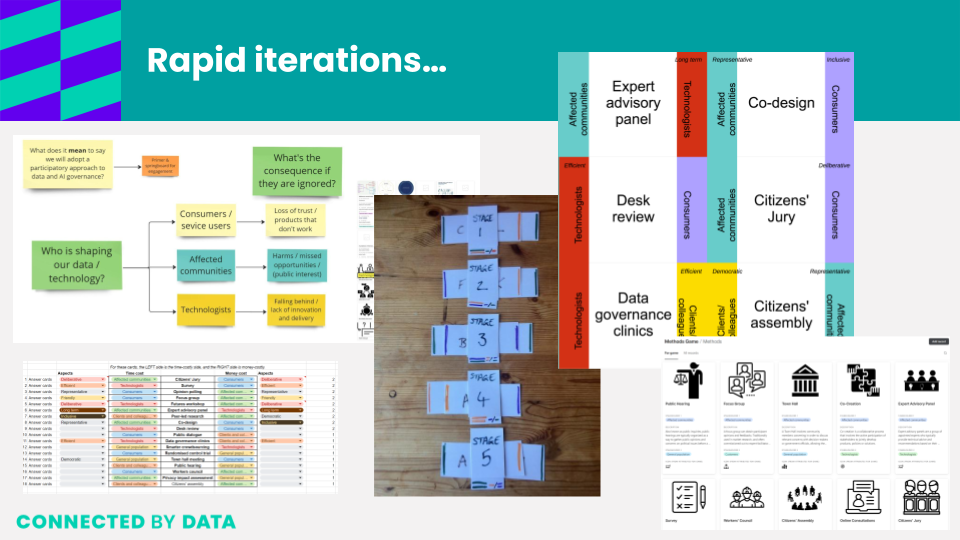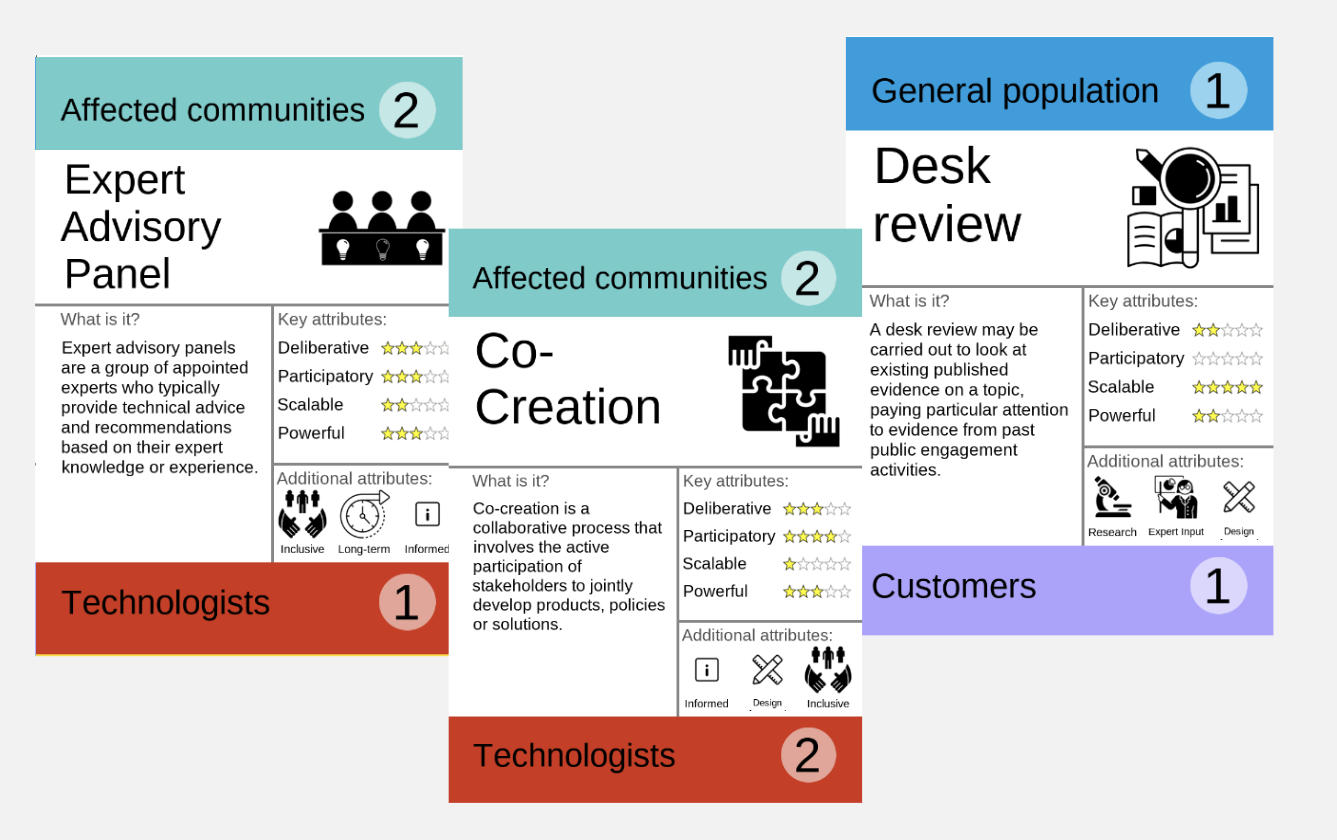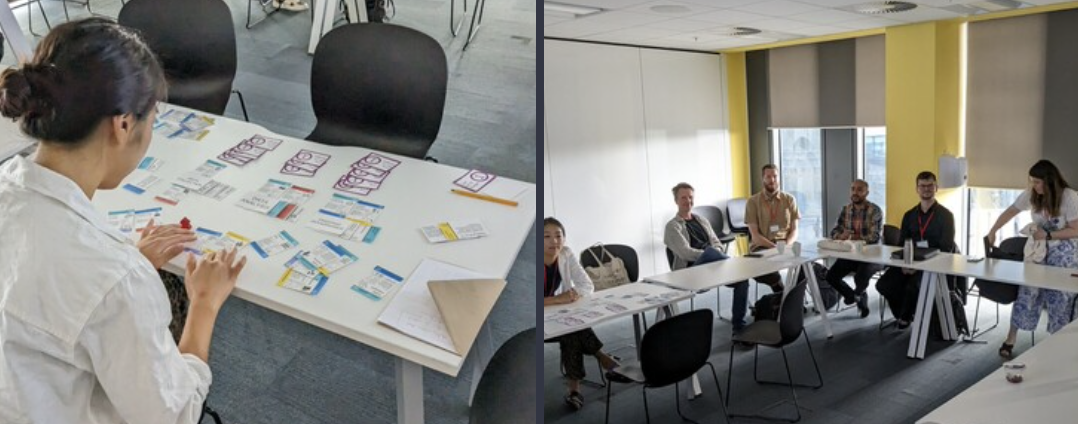Gaming governance - initial play-testing a resource to explore participation methods
At the Data Justice Conference in Cardiff a few weeks ago we ran the first public play test of a card game designed to support conversations about collective and participatory data governance.
It’s the first iteration of the output from our participation design lab process exploring game design both as a method for researching methods to involve communities in data governance, and as a way of generating resources that might help inspire and embed new ways of working, particularly within private sector contexts.
Developing version 0.1
This focus on commercial governance of data emerged during our first design lab meeting, with input from Lara Groves and , as game designer Jess Metheringham invited us to think about the particular audiences we were creating for, and as we followed a journey of refining problem definitions.
The first iteration of the game responds then to the problem statement:
How can we support product managers and owners to understand the building blocks of participatory data governance, and adopt or advocate for these practices?
Over a few cycles of brainstorming and sketching, we settled on a game that invites a group of four players to imagine they are the ‘data engagement and governance group’ for a new commercial data product, and to work through four rounds of identifying the particular requirements for engagement at each stage of a data product lifecycle, and selecting methods of engagement and governance that could be a good fit.

To provide the methods, we’ve drawn on a mix of examples drawn from our case study research into existing participatory data governance, complemented with other examples taken from the Participedia dataset. For each method, we created a card that describes the kinds of stakeholder groups that method might be good at reaching (choosing from ‘affected communities’, ‘customers’, ‘general population’, ‘technologists’ and ‘internal stakeholders’), and that contains stars scales and symbols for the kinds of properties each method has.

I won’t describe the full rules of gameplay here, as they are still very much a work-in-progress (and you can get a sense of them from the workshop slides), but in essence the luck of the cards creates a set of constraints on the kinds of participatory methods a project might use that seek to mirror some of the real-world constraints and contingencies that might come up when running a commercial (or indeed, public sector) data project.
Testing and learning

At the Data Justice Lab we had three different groups testing the game, running through with a ‘game master’ (one of the Connected by Data team) in about 40 minutes of play. We then came together to collect group feedback and reflect both on what we had learnt from the game, and how it might be developed further in future. A number of the themes coming up are summarised below.
Learning about new methods. A number of people commented that they had come across new methods for participatory engagement from the cards, including some they may explore more.
This felt like a success right away: though we need to explore more to see if people pick up on appropriate methods for the kinds of context they are working in, and to explore how far awareness of a wider range of methods raises ambition for including participants, rather than encourages choice of low cost/low impact satisficing options.
Discussing individual methods. We had a number of conversations about the cost (1 - 5), evaluation scales (for levels of participation, deliberation, scalability and power) and attributes (tags for things like ‘inclusive’ or ‘invite only’) on the cards. For example: “Why are surveys labelled as deliberative?” (Our error!), or “Would this really cost that much to deliver?”.
The cards are an early draft, and we want to go through more of this detailed discussion to make sure the data we include on them is as grounded as possible - although there will always be room for debate.
The value of constraints. A number of people commented on the value of the constraints presented by the game: making it much more like real-world situations of finding the best fit for a limited scenario.
We identified that discussing the requirements introduced by cards throughout the game could be a good way to explore the constraints that public and private sector actors operate under - talking about whether the imagined scenarios we have presented are realistic or not, or how these resonate with people’s experience.
Participation in data, or in governance of data? Across all our groups we faced some confusion over whether the methods presented (e.g. Survey, Randomised Control Trial etc.) were to be used to collect and analyse data for a project, or, as we intended, to give stakeholders a role in governing data.
This raises design feedback for the game (it’s something we can make clearer in the way we label game stages etc.), but also highlights the complex landscape around participatory data and AI: from participation and democratisation deployed as synonyms for having one’s data included in a dataset, through to more active participatory design of systems (Birhane et. al, 2022), through to participatory oversight and governance.
We will need to think about how the game can contribute towards the disambiguation of different meanings of participation, or the language and mechanics we might want to use to be very clear about our focus on data governance.
We could use this. It was great to hear a number of people immediately reflecting on how they might use the game itself, or similar gamification ideas, in their upcoming work.
Where next
The themes above are far from exhaustive, and Jess captured many more notes focussing on the game mechanics and design (e.g. how people are attracted more to colour than symbols on the cards when choosing how to complete a stage).
In a few weeks we’ll bring a small group together to review learning from our first playtests, and to plot out activity to refine the game further over the coming months.
Maria is planning a play-test as well alongside CPDP in Rio de Janeiro in a few weeks, and we’re already thinking about other moments to test iterations in the coming months.
Watch this space!
